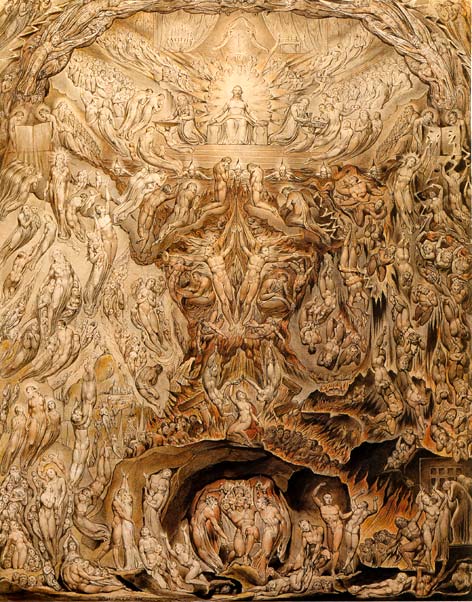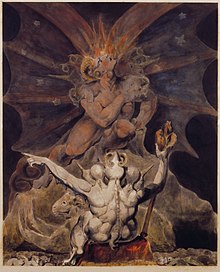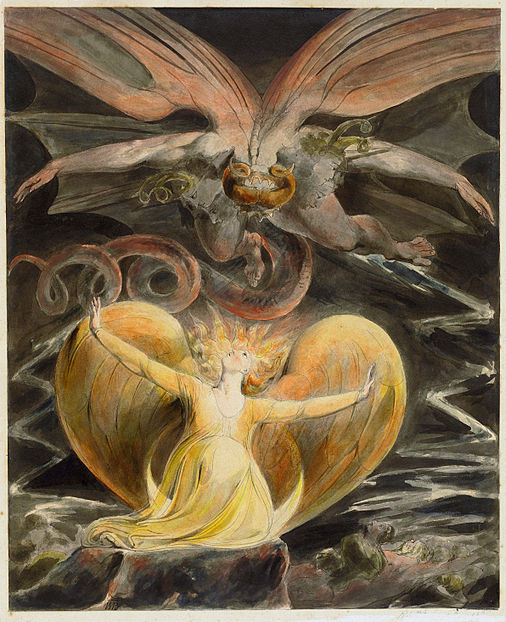Yale Center for British Art
Jerusalem
Plate 47
This image shows as clearly as any the divisions in the one man Albion. These are words we find in the text:
'tore forth'
'break forth'
'Mingles'
'enslaved and tormented'
'bound in vengeance & enmity'
Jerusalem , PLATE 47, (E 196)
"[When Albion utterd his last words Hope is banishd from me]
From Camberwell to Highgate where the mighty Thames shudders along,
Where Los's Furnaces stand, where Jerusalem & Vala howl:
Luvah tore forth from Albions Loins, in fibrous veins, in rivers
Of blood over Europe: a Vegetating Root in grinding pain.
Animating the Dragon Temples, soon to become that Holy Fiend
The Wicker Man of Scandinavia in which cruelly consumed
The Captives reard to heaven howl in flames among the stars
Loud the cries of War on the Rhine & Danube, with Albions Sons,
Away from Beulahs hills & vales break forth the Souls of the Dead,
With cymbal, trumpet, clarion; & the scythed chariots of Britain.
And the Veil of Vala, is composed of the Spectres of the Dead
Hark! the mingling cries of Luvah with the Sons of Albion
Hark! & Record the terrible wonder! that the Punisher
Mingles with his Victims Spectre, enslaved and tormented
To him whom he has murderd, bound in vengeance & enmity
Shudder not, but Write, & the hand of God will assist you!
Therefore I write Albions last words. Hope is banish'd from me."
The words of the text speak of the one man being violently divided and yet being unable to be split apart in complete separation. The picture shows three figures linked as if in a chain. They can be seen as one figure, Albion, being torn apart into Luvah, Vala and Jerusalem. Jerusalem would be the central figure under the feet of Vala yet reaching up to heaven with one hand and down to earth with the other. Vala and Luvah exhibit the arm position of despair and being locked off from any influx of enlightenment.
The paradox of the psyche is unity in diversity. It is a whole which may be expressed as parts. The parts cannot exist independently although they may attempt to. Luvah apart from Albion tears Jerusalem from her position and creates Vala as a tormented slave. The bonds of love within the psyche become bonds of 'vengeance & enmity.'
War is the image of this psychological condition. War results from individual nations attempting to establish separate, dominant positions. When nations do not acknowledge their inclusion in the unity and interdependence of the whole, they become hostile to nations who exhibit different values. Projection ensues and each nation perceives threat from others. The recognition of Brotherhood breaks down projection because the enemy seen as brother is no longer a threat. But if the victim cannot see the punisher as his brother his own Selfhood will unite with the punisher and he will become slave to his Selfhood.
Blake recognises that error is not apparent until the consequences become unbearable. At which point the 'wheels of war' can be exchanged fro the 'wings of cherubim' through forgiveness.
Jerusalem , Plate 22,(E 168)
"Why should Punishment Weave the Veil with Iron Wheels of War
When Forgiveness might it Weave with Wings of Cherubim"
.













